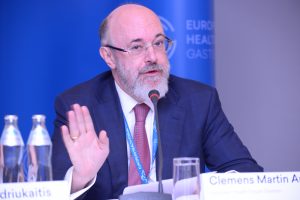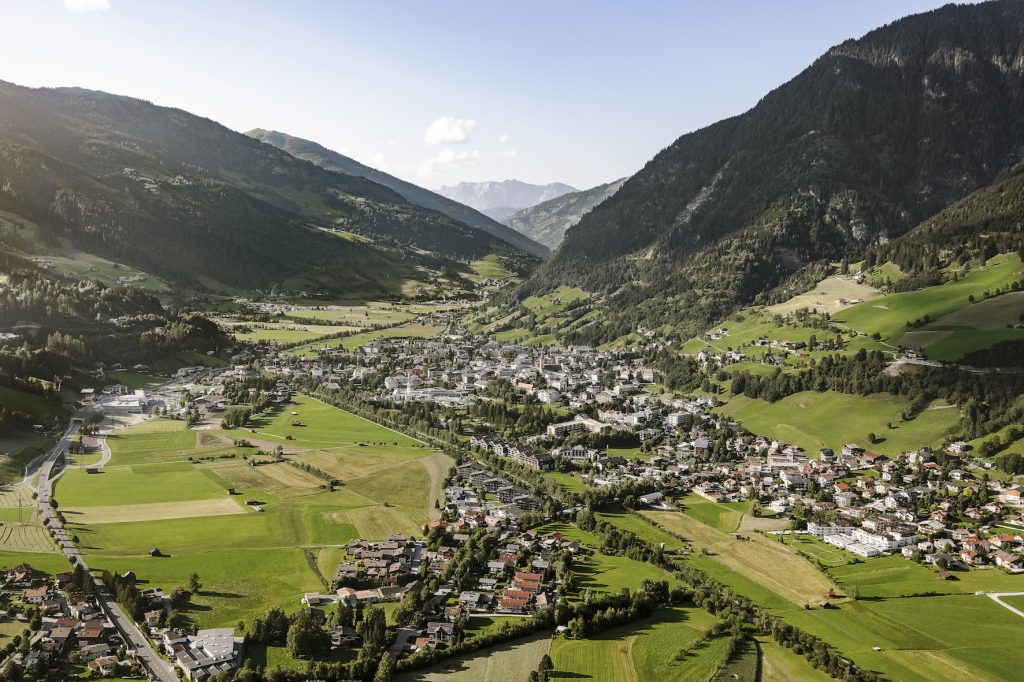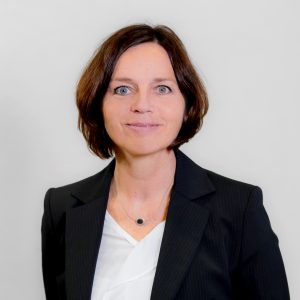The European Health Forum Gastein is celebrating its 25th anniversary and remains loyal to its principles: being open to new ideas and working together to find innovative solutions to major issues. The theme for the EHFG 2022 is: “A moonshot for a true European Health Union – If not now, when?”
Text: Dietmar Schobel
We are all affected by health-related issues, and the response to them can only be found if we work together, transgressing the borders of nations and sectors. That is the reason why Europe needs a forum for health policies. – This is a summary of the basic idea behind the European Health Forum Gastein (EHFG), brought forward by physician and former member of the Austrian Parliament Günther Leiner. The many people who helped him to put this idea into practice in the early days included the former Commissioner of the European Union (EU) Pádraig Flynn from Ireland and the former German Chancellor Helmut Kohl.
In 1998, the EHFG took place for the first time, and its theme was “Creating a Better Future for Health Systems in Europe”. Around 200 people travelled to Gastein to exchange and discuss their experiences. Since then, the health policy event has been held 24 times, and the average annual number of participants has grown to around 600 people. The principles of the EHFG, which has long since become the most important health policy conference in Europe, have remained the same. Its four pillars bring together representatives from all areas of society – the public and private sectors, science & academia, and civil society – enabling them to talk to each other and work together as a team.
All hands on board

“We consider it very important that the participants are not just representatives from health systems, but also people who work in the areas of infrastructure, education, the economy, the environment and other important policy areas, because health is influenced by all of these,” remarks Clemens Martin Auer, President of the EHFG. He emphasises that the Gastein valley hosts discussions with – and not about – industry, and continues: “The debates are sometimes heated, but they are always amicable.”
The debates are sometimes heated, but they are always amicable.
CLEMENS MARTIN AUER, PRESIDENT OF THE EHFG

In the secluded Gastein valley, far away from the hustle and bustle of life in Brussels and other major European cities, the conditions are ideal for working on the most important issues in the health sector and beyond. In this environment, new paths towards solutions can be found in a process of discussion and cooperation. One example of this are the initial proposals for the right to receive cross-border healthcare within the EU, which were launched many years ago at the EHFG, and the directive was then published in 2011. Other examples include the collaboration between several European organisations for socially disadvantaged groups to establish the initiative “No one left behind”, which was launched in the Gastein valley, or an initiative for a “European Health Union” emerging at EHFG 2020. The initiative has been facilitated by the EHFG and has since published a relevant manifesto and engaged in many events and publications, thereby putting itself into the centre of discussions within the European health policy scene.
Addressing current developments
“Some topics such as sustainability and health equity have accompanied us over the years and are repeatedly revisited,” says Dorli Kahr-Gottlieb, EHFG Secretary General since 2012. She emphasises one aspect in particular: “We want to be open to new ideas at all times and address current developments or initiate discussions about the future.” In the best-case scenario, the participants take the topics discussed in the Gastein valley back with them to the European capitals and the EU metropolis of Brussels, where the ideas are developed further and implemented.
We want to be open to new ideas at all times.
DORLI KAHR-GOTTLIEB, EHFG SECRETARY GENERAL
The relevance of the event is amplified by the participation of decision makers such as the current and former EU Commissioners for Health and Food Safety, the health ministers of various countries, and also senior executives of ministries and managers from European authorities such as the European Centre for Disease Control (ECDC) and the Health Emergency Preparedness and Response Agency (HERA). Representatives from the business sector meet up with non-governmental organisations at the conference, and masterminds from important think tanks join renowned scientists. In Bad Hofgastein there is a good chance of meeting many of the participants personally, which makes the EHFG a great place to build networks and initiate new cooperations.
The end of one conference marks the beginning of another

For Dorli Kahr-Gottlieb and the EHFG core team which currently consists of ten people, work on the next event begins as soon as the previous one ends. The first step is to evaluate the participants’ feedback and results and procedures of the prior conference. The main theme for the coming event is chosen in consultation with the Advisory Committee and the EHFG Board, both of which are made up of 15 members representing the four EHFG pillars. The Board functions as the decision-making body of the EHFG association, while the scientific Advisory Committee reviews proposals for sessions and consults the EHFG team. These proposals are submitted by external partners from all areas of health – and beyond. The European Commission and Austrian Ministry of Health have been supporters and actively involved from the outset, and many other partners such as the World Health Organization, international private companies and their umbrella organisations and also European civil society organisations, have been associated with the EHFG for many years as well.
Due to the COVID-19 pandemic, the EHFG had to be held online for two years. During this time webinars were added to the activities, and these are now held throughout the year. In 2022, the EHFG is being organised as a hybrid conference, and it will therefore allow participants both to take part online and also – finally – to attend the event in the Gastein valley in person again. The issues being discussed at the European Health Forum Gastein this year naturally also reflect the changes brought about by the COVID-19 pandemic. Following initial reactions such as closing borders and export bans for medical devices, the pandemic has ultimately also shown what is possible when the Member States of the European Union work together in the area of health. The joint procurement of vaccines and the fact that loans have been taken out jointly for the first time in order to deal with the consequences of the COVID-19 pandemic are two examples here.
If not now, when?
The COVID-19 pandemic has placed the topic of health in the focus of political interest overall. Many health experts therefore believe that this window of opportunity must be used to finally fulfil the ambition for better health among populations and greater cooperation across countries and sectors. This is expressed by the theme for the EHFG 2022: “A moonshot for a true European Health Union – If not now, when?”. This year’s conference, when the EHFG will also be celebrating its 25th anniversary, intends to find some answers to this question. And if the organisers have their way, these answers will be subsequently integrated into important policy and social decisions – in Brussels and also in other major European cities.
A NETWORK FOR PROMISING YOUNG HEALTH PROFESSIONALS
Since as early as 2007, scholarships for the European Health Forum Gastein have been awarded to promising young health professionals from different backgrounds and with diverse professional experience, enabling them to take part in Europe’s most important health policy event free of charge. They are given the chance to learn about current developments in the area of health across Europe and worldwide, they are able to take on practical responsibilities, such as writing reports on sessions and holding interviews, and they can also form networks with each other and with senior policymakers and academics. The network of Young Gasteiners is currently comprised of around 600 enthusiastic members. The President of the European Health Forum Gastein Clemens Martin Auer expresses his pleasure at the sustained success of this initiative: “Nowadays, whenever I attend an international health policy event, I almost always meet a number of Young Gasteiners.”
